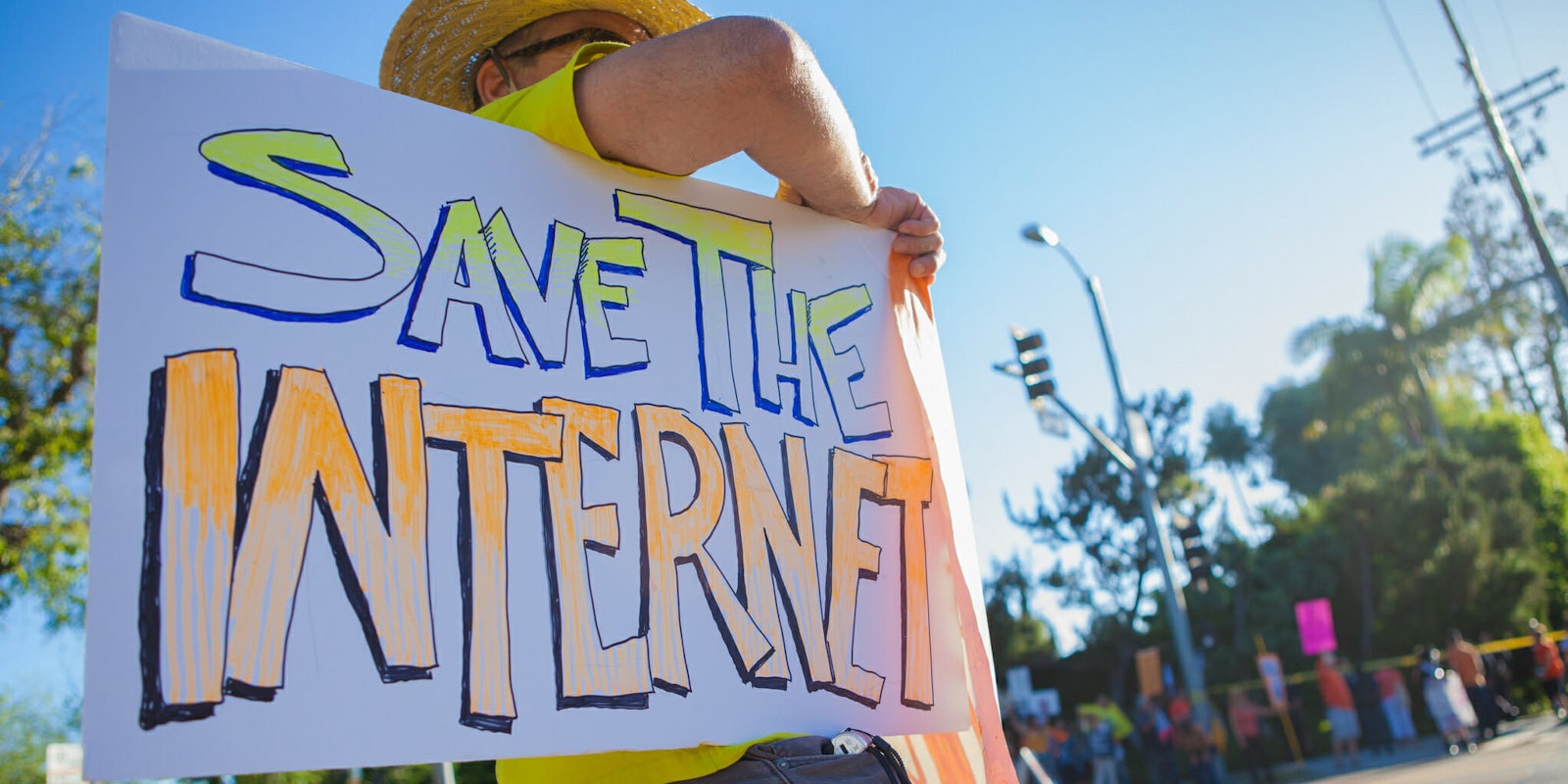Opinion
Today is the “Day of Action,” which might turn out to be one of the biggest digital protests in internet history and a possible last chance to prevent the eroding of net neutrality, the idea that rules all internet traffic should be treated equally.
This is the latest episode in a years-long battle that has pitted broadband internet service providers—who now have the Federal Communication Commission on their side—against proponents of the open internet, which includes consumer advocacy groups and major internet companies.
But this isn’t just about advocacy groups and corporations—it’s about saving your ability to access the entire internet without having to pay more to do so.
Basically, net neutrality is the principle that prevents ISPs from making the internet unfair to serve their own commercial needs. (In reality, however, it’s a bit more complicated.)
For instance, if an ISP like Comcast acquires a streaming company, it shouldn’t be able to slow down or block other streaming services or websites in favor of its own. Neither should companies be allowed to buy fast lanes from ISPs, or pay up to prioritize traffic on their websites and services, because it would prevent smaller and less-financed companies to compete with the bigger players.
In 2015, the FCC voted to classify wireless and fixed-line broadband service providers as Title II “common carriers,” a designation that would give legal backing to net neutrality rules. This would effectively put FCC in a position to regulate the industry and have oversight on how ISPs operate, set rates and treat competitors.
Tom Wheeler, who was chairman of the FCC at the time, called the internet “the most powerful and pervasive platform on the planet” that is “too important to be left without rules and without a referee on the field.”
But that is exactly what is about to happen. Led by Trump-appointed Chairman Ajit Pai, the new FCC is weighing options to repeal the Title II classification and leave ISPs to their own devices. The decision, made in May, is pending a 90-day review and comments from the public. The deadline for feedback is July 17.
Wednesday’s “Day of Action” event, organized by Fight for the Future, Free Press Action Fund, and Demand Progress, and backed by hundreds of companies and organizations, is meant to raise public awareness on the consequences of giving free rein to ISPs to regulate themselves, and to urge users to reach out to the FCC or Congress and call for the existing rules to remain.
Advocates of net neutrality, who count among their ranks content providers such as Facebook, Google, Amazon, Netflix, the trade group Internet Association, and Last Week Tonight host John Oliver, argue that when consumers pay for internet connectivity, they should gain access to all of it equally.
Without net neutrality, the proponents say, ISPs will end up giving users some curated or stripped down version of the internet, and ask them to pay a premium for the rest.
On Wednesday’s “Day of Action,” participating websites are featuring banners, pop-ups or other visuals such as the spinning wheel icon to support the cause of net neutrality. The Internet Association has put up some creative artwork on its website to depict what the unraveling of net neutrality would look like.
Opponents of net neutrality, including FCC Chairman Pai and major broadband companies such as Verizon, Comcast, AT&T and Cox, categorically dismiss the concerns of net neutrality supporters, calling them hypothetical and without merit. They also claim that they support open internet principles and will willingly implement them without stringent rules and government oversight.
Hypothetical or not, the supporters of net neutrality don’t want to see those concerns come to fruition, and given broadband companies’ track record of undermining the open internet, it’s fair to say that their consternation isn’t misplaced.
“We haven’t actually lived in a world where fully the ISPs could block access,” says Denelle Dixon, chief legal and business officer at Mozilla, a vocal supporter of net neutrality and open internet. “It’s very hard to imagine a world without [net neutrality]. This is the world we need to imagine now.”
Pai doesn’t want the government to become the regulator of the internet and argues that putting a “bureaucratic straitjacket” on the industry will slow down investments in the expansion of broadband access and innovation, a claim that the Internet Association rejects. Investment isn’t the only metric to consider when gauging the success of net neutrality, and internet provider stock prices continue to rise, which means investors aren’t devastated by net neutrality rules after two years.
“Comcast and the big Internet access providers already succeeded in getting rid of the rules that protect your online privacy,” said Gigi Sohn, former counselor to previous FCC Chairman Tom Wheeler and Distinguished Fellow at the Institute for Technology Law & Policy at Georgetown University Law School. “Now they’re coming for your Internet. By asking the FCC to get rid of the net neutrality rules, they will turn the Internet into the worst of cable TV—unless consumers stop them. As someone who has helped make these decisions, I can tell you that it matters that you speak out and tell your story. And that time is now.”
The organizers of the “Day of Action” have set up a website where supporters of net neutrality can find instructions and guidance on how to take part in the action.
Ben Dickson is a software engineer and the founder of TechTalks. Follow his tweets at @bendee983 and his updates on Facebook.


